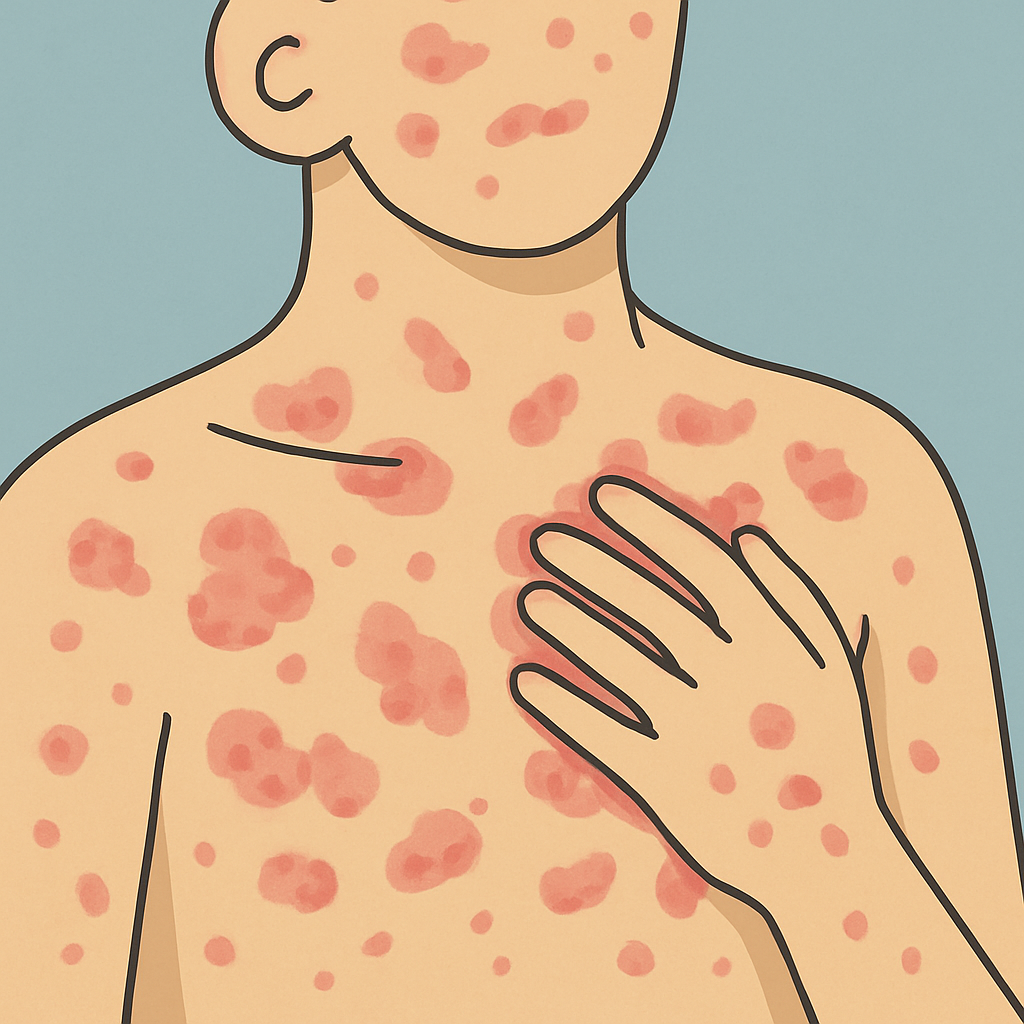Diet and Urticaria: Foods to Eat and Avoid for Managing Allergic Reactions


have already shared their stories
Managing urticaria, commonly known as hives, can be challenging, especially when it comes to identifying and avoiding dietary triggers. A well-planned diet can play a significant role in reducing the frequency and severity of urticaria flare-ups. In this blog post, we will explore foods that trigger urticaria, a detox diet for urticaria, and foods to avoid with urticaria to help manage allergic reactions effectively.
Understanding Urticaria and Its Triggers
Urticaria is characterized by red, itchy welts on the skin that can vary in size and shape. These welts are often triggered by allergens, stress, infections, or other factors, including certain foods. Identifying and avoiding dietary triggers is crucial for managing urticaria effectively.
Foods That Trigger Urticaria
Certain foods are known to trigger urticaria in sensitive individuals. Common food triggers include:
Histamine-Rich Foods
Histamine is a compound involved in the body's immune response, and consuming foods high in histamine can exacerbate urticaria symptoms. Foods rich in histamine include:
- Aged Cheeses: Parmesan, blue cheese, and Gouda.
- Processed Meats: Salami, pepperoni, and ham.
- Fermented Foods: Sauerkraut, kimchi, and yogurt.
- Alcoholic Beverages: Beer, wine, and champagne.
Food Additives
Artificial additives and preservatives can also trigger urticaria. Common culprits include:
- Artificial Colorants: Such as tartrazine and sunset yellow.
- Preservatives: Like sulfites, benzoates, and nitrates.
- Flavor Enhancers: Including monosodium glutamate (MSG).

Specific Allergens
Certain foods can trigger allergic reactions leading to urticaria. These allergens vary from person to person but often include:
- Shellfish: Shrimp, crab, and lobster, clams and osters.
- Nuts: Peanuts, almonds, and cashews.
- Dairy Products: Milk, cheese, and butter.
- Eggs: Both egg whites and yolks.

Detox Diet for Urticaria
A detox diet can help eliminate potential triggers from your system and identify foods that may be causing urticaria flare-ups. Here are some steps to follow:
Elimination Phase
Remove common allergens and histamine-rich foods from your diet for a few weeks. Focus on simple, whole foods such as:
- Fruits: Apples, pears, and blueberries (avoid strawberries, which may trigger histamine release).
- Vegetables: Carrots, broccoli, and zucchini (be cautious with leafy greens like spinach or pre-packaged salad mixes, which can be high in histamine).
- Lean Proteins: Freshly cooked chicken or turkey. Soy-based foods like tofu should be tested individually, as they can cause reactions in some people.
- Grains: Rice, millet, quinoa, and gluten-free oats.
Reintroduction Phase
Gradually reintroduce eliminated foods one at a time, allowing a few days between each new food. Monitor your body's reactions closely to identify any triggers.

Hydration
Drink plenty of water to help flush out toxins and maintain hydration. Herbal teas like chamomile and peppermint can also be soothing.
Supplements
Consider supplements that support skin health and reduce inflammation, such as:
- Vitamin C: Helps reduce histamine levels.
- Quercetin: A natural antihistamine found in apples and onions.
- Probiotics: Supports gut health, which can impact immune response.

Foods to Avoid with Urticaria
To manage urticaria effectively, it's important to avoid foods that are known to trigger or worsen symptoms. These include:
Spicy Foods
Spicy foods can increase body temperature and trigger histamine release, exacerbating urticaria symptoms. Avoid foods like chili peppers, hot sauce, and spicy curries.
Caffeinated Beverages
Caffeine can stimulate the release of histamine and other chemicals that trigger urticaria. Limit consumption of coffee, tea, and energy drinks.
Citrus Fruits
Citrus fruits, such as oranges, lemons, and grapefruits, contain high levels of histamine and can trigger urticaria in some individuals.
Tomatoes
Tomatoes and tomato-based products can be problematic due to their high histamine content. Avoid fresh tomatoes, ketchup, and tomato sauces.
Processed and Fast Foods
These foods often contain additives, preservatives, and high levels of histamine. Opt for homemade meals using fresh ingredients to reduce the risk of triggering urticaria.
Additional Histamine-Related Triggers
Some foods can worsen urticaria symptoms not because they are allergens, but because they either contain high levels of histamine, stimulate the body to release histamine, or interfere with histamine breakdown. These include strawberries, bananas, and eggplant, as well as mushrooms and yeast-containing products like baker’s yeast and yeast extract. Most cheeses—especially aged varieties—can also be problematic, with exceptions like young Gouda, plain cream cheese, or butter cheese. Processed or cured meats such as salami and raw ham tend to be high in histamine, while cooked ham is often better tolerated. In addition, reheated or kept-warm foods can accumulate histamine over time and may trigger or intensify symptoms.
Conclusion
Managing urticaria through diet involves identifying and avoiding foods that trigger symptoms while incorporating a detox diet to help cleanse the body and identify specific allergens. By being mindful of foods that can exacerbate urticaria and focusing on a balanced, whole-foods diet, individuals can better control their symptoms and improve their quality of life. If you suspect certain foods are triggering your urticaria, consult with a healthcare professional or a registered dietitian for personalized advice and guidance.
Be aware: Food tolerances in chronic urticaria can vary significantly from person to person. The suggestions in this article are general and may not apply to everyone. Always consult with a healthcare provider or registered dietitian to determine the most appropriate dietary strategy for your individual condition.

have already shared their stories
Sources
- Zuberbier, T., Aberer, W., Asero, R., et al. (2018). The EAACI/GA²LEN/EDF/WAO guideline for the definition, classification, diagnosis and management of urticaria. Allergy, 73(7), 1393-1414. https://doi.org/10.1111/all.13397
- Magerl, M., & Maurer, M. (2019). Chronic Urticaria: An Overview of Treatment and Recent Patents. Journal of Investigational Allergology and Clinical Immunology, 29(2), 81-90. https://doi.org/10.18176/jiaci.0365
- Cornillier, H., Giraudeau, B., Munck, S., et al. (2019). Effect of Diet in Chronic Spontaneous Urticaria: A Systematic Review. Acta Dermato-Venereologica, 99(2), 127-132. https://doi.org/10.2340/00015555-3015
- Katta, R., & Schlichte, M. (2014). Diet and dermatitis: food triggers. The Journal of Clinical and Aesthetic Dermatology, 7(3), 30-36.
- Metz, M., Ohanyan, T., Church, M. K., & Maurer, M. (2014). Omalizumab is an effective and rapidly acting therapy in difficult-to-treat chronic urticaria: A retrospective clinical analysis. Journal of Dermatological Science, 73(1), 57-62.
- Saini, S. S., Bindslev-Jensen, C., Maurer, M., et al. (2015). Efficacy and safety of omalizumab in patients with chronic idiopathic/spontaneous urticaria who remain symptomatic on H1 antihistamines: a randomized, placebo-controlled study. Journal of Investigative Dermatology, 135(1), 67-75.








.avif)

